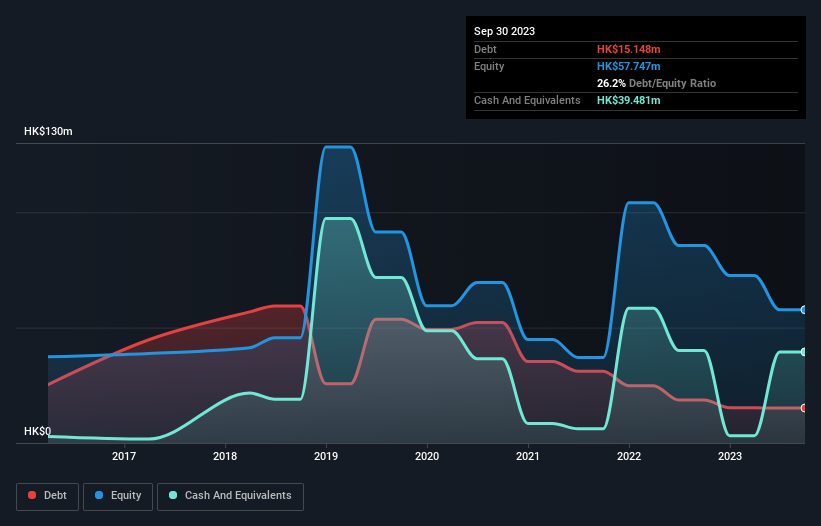Health Check: How Prudently Does KNT Holdings (HKG:1025) Use Debt?
Legendary fund manager Li Lu (who Charlie Munger backed) once said, 'The biggest investment risk is not the volatility of prices, but whether you will suffer a permanent loss of capital.' So it might be obvious that you need to consider debt, when you think about how risky any given stock is, because too much debt can sink a company. Importantly, KNT Holdings Limited (HKG:1025) does carry debt. But should shareholders be worried about its use of debt?
Why Does Debt Bring Risk?
Debt assists a business until the business has trouble paying it off, either with new capital or with free cash flow. If things get really bad, the lenders can take control of the business. However, a more frequent (but still costly) occurrence is where a company must issue shares at bargain-basement prices, permanently diluting shareholders, just to shore up its balance sheet. Having said that, the most common situation is where a company manages its debt reasonably well - and to its own advantage. The first thing to do when considering how much debt a business uses is to look at its cash and debt together.
View our latest analysis for KNT Holdings
What Is KNT Holdings's Debt?
The image below, which you can click on for greater detail, shows that KNT Holdings had debt of HK$15.1m at the end of September 2023, a reduction from HK$18.6m over a year. But on the other hand it also has HK$39.5m in cash, leading to a HK$24.3m net cash position.

A Look At KNT Holdings' Liabilities
We can see from the most recent balance sheet that KNT Holdings had liabilities of HK$46.9m falling due within a year, and liabilities of HK$5.52m due beyond that. Offsetting this, it had HK$39.5m in cash and HK$17.4m in receivables that were due within 12 months. So it can boast HK$4.55m more liquid assets than total liabilities.
Having regard to KNT Holdings' size, it seems that its liquid assets are well balanced with its total liabilities. So it's very unlikely that the HK$278.0m company is short on cash, but still worth keeping an eye on the balance sheet. Simply put, the fact that KNT Holdings has more cash than debt is arguably a good indication that it can manage its debt safely. The balance sheet is clearly the area to focus on when you are analysing debt. But you can't view debt in total isolation; since KNT Holdings will need earnings to service that debt. So when considering debt, it's definitely worth looking at the earnings trend. Click here for an interactive snapshot.
Over 12 months, KNT Holdings made a loss at the EBIT level, and saw its revenue drop to HK$57m, which is a fall of 29%. That makes us nervous, to say the least.
So How Risky Is KNT Holdings?
Statistically speaking companies that lose money are riskier than those that make money. And the fact is that over the last twelve months KNT Holdings lost money at the earnings before interest and tax (EBIT) line. Indeed, in that time it burnt through HK$14m of cash and made a loss of HK$28m. Given it only has net cash of HK$24.3m, the company may need to raise more capital if it doesn't reach break-even soon. Overall, its balance sheet doesn't seem overly risky, at the moment, but we're always cautious until we see the positive free cash flow. When analysing debt levels, the balance sheet is the obvious place to start. However, not all investment risk resides within the balance sheet - far from it. For instance, we've identified 3 warning signs for KNT Holdings (1 is significant) you should be aware of.
If you're interested in investing in businesses that can grow profits without the burden of debt, then check out this free list of growing businesses that have net cash on the balance sheet.
Valuation is complex, but we're here to simplify it.
Discover if KNT Holdings might be undervalued or overvalued with our detailed analysis, featuring fair value estimates, potential risks, dividends, insider trades, and its financial condition.
Access Free AnalysisHave feedback on this article? Concerned about the content? Get in touch with us directly. Alternatively, email editorial-team (at) simplywallst.com.
This article by Simply Wall St is general in nature. We provide commentary based on historical data and analyst forecasts only using an unbiased methodology and our articles are not intended to be financial advice. It does not constitute a recommendation to buy or sell any stock, and does not take account of your objectives, or your financial situation. We aim to bring you long-term focused analysis driven by fundamental data. Note that our analysis may not factor in the latest price-sensitive company announcements or qualitative material. Simply Wall St has no position in any stocks mentioned.
About SEHK:1025
KNT Holdings
An investment holding company, manufactures, retails, and trades in garments in the United States, Hong Kong, Europe, Australia, and the United Kingdom.
Adequate balance sheet with very low risk.
Market Insights
Community Narratives



